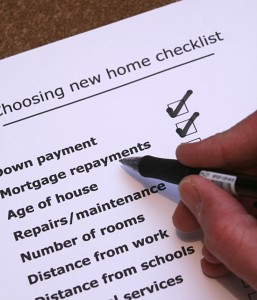Mortgage rates that have been stuck at historical lows for quite some time have gotten the attention of many a prospective homebuyer. Naturally, consumers think this is a fantastic time to buy a home when mortgage rates have been hovering around 3-4 percent for a couple of years now. But these days, mortgage lenders are denying plenty of Americans the opportunity to mortgage loan due to perceived risks.
Along with historically low mortgage rates have come much stricter standards that are used to determine whether a prospective buyer will qualify for a mortgage loan. Here are some of the things lenders are looking for:
High Credit Scores
If you have a credit score below 749, you aren’t likely to qualify for a mortgage. The average credit score of approved homebuyers was 749 in 2012, and the average of those denied was 649.
Large Down Payments
Unless you’re qualifying for a VA loan or USDA home loan, you’ll need to put down 3.5% for an FHA loan or 5-10% for a conventional loan. Make sure you have enough cash for the down payment and closing, as well as reserves for any minor repairs or cosmetic updates before you consider shopping for a home. You can also use a mortgage calculator to help you figure out if you really can afford a home.
Documentation
Before the real estate crash, lenders didn’t require much paperwork to prove the financial stability of the prospective homebuyer. Now you need documentation, and lots of it, to prove you can pay back the loan. This includes documentation to show income, assets, debts and employment.
Stable Income
In that same vein of showing extensive documentation, self-employed borrowers or independent contractors will likely be out of luck when trying to get a mortgage. Even if you walk in armed with years of tax returns to show how much money you’ve made in previous years, banks want to see a steady paycheck before they’ll approve a loan.
Lenders aren’t making it easy to qualify for home mortgages and even if you think you’re financially stable enough to secure a home loan, the banks probably won’t be as quick to agree. But if you go in prepared for every curve the lender might throw your way, you’ll have a better chance of getting a home loan.
Mortgage rates that have been stuck at historical lows for quite some time have gotten the attention of many a prospective homebuyer. Naturally, consumers think this is a fantastic time to buy a home when mortgage rates have been hovering around 3-4 percent for a couple of years now. But these days, mortgage lenders are denying plenty of Americans the opportunity to mortgage loan due to perceived risks.
Along with historically low mortgage rates have come much stricter standards that are used to determine whether a prospective buyer will qualify for a mortgage loan. Here are some of the things lenders are looking for:
High Credit Scores
If you have a credit score below 749, you aren’t likely to qualify for a mortgage. The average credit score of approved homebuyers was 749 in 2012, and the average of those denied was 649.
Large Down Payments
Unless you’re qualifying for a VA loan or USDA home loan, you’ll need to put down 3.5% for an FHA loan or 5-10% for a conventional loan. Make sure you have enough cash for the down payment and closing, as well as reserves for any minor repairs or cosmetic updates before you consider shopping for a home. You can also use a mortgage calculator to help you figure out if you really can afford a home.
Documentation
Before the real estate crash, lenders didn’t require much paperwork to prove the financial stability of the prospective homebuyer. Now you need documentation, and lots of it, to prove you can pay back the loan. This includes documentation to show income, assets, debts and employment.
Stable Income
In that same vein of showing extensive documentation, self-employed borrowers or independent contractors will likely be out of luck when trying to get a mortgage. Even if you walk in armed with years of tax returns to show how much money you’ve made in previous years, banks want to see a steady paycheck before they’ll approve a loan.
Lenders aren’t making it easy to qualify for home mortgages and even if you think you’re financially stable enough to secure a home loan, the banks probably won’t be as quick to agree. But if you go in prepared for every curve the lender might throw your way, you’ll have a better chance of getting a home loan.


